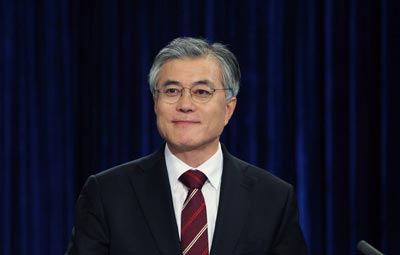| « Media Scoundrels’ Rage Over Comey’s Firing | Chronic Fatigue Syndromes, POTS and the Dangers of Aluminum-adjuvanted Vaccines like Gardisil » |
New South Korean President Wants Improved Ties with North
Stephen Lendman
Moon Jae-In is poised to become South Korea’s next president - assuming office as soon as Seoul’s Central Electoral Commission certifies final results - after triumphing decisively with over 41% support in a field of 12 aspirants.
His nearest two rivals got 23.3% and 21.8% support respectively. He’ll serve a single five-year term. In 2012, he lost to Park Geun-hye - impeached last December on corruption charges, suspended from office, then ousted in March, arrested and detained. In April, she was formally charged with abuse of power, bribery, coercion and leaking government secrets. She faces trial and possible imprisonment.
Human rights attorney Moon earlier served as former President Roh-Moo-hyun’s chief of staff. He co-founded The Hankyoreh, a South Korean progressive broadsheet.
He was a Minbun member, South Korea’s organization of progressive lawyers, formed after the country’s military dictatorship ended. He was chairman of the Busan Civil & Human Rights Lawyers group.
In 2015, he was elected leader of New Politics Alliance for Democracy. He favors dialogue with Pyongyang, a return to earlier Sunshine Policy under Presidents Kim Dae-jung and Roh Moo-hyun, wants to meet with Kim Jong-Un, along with opposition to provocative US deployed THAAD missiles on South Korean territory.
North Korean media remained quiet about him during the campaign, refraining from hostile invectives usually used against conservative South Korean leaders subservient to Washington.
They called Park Geun-hye a “prostitute…pimped” by US presidents, blaming her “venomous swish of skirt” for heightened tensions.
Ban Ki-moon was insulted after rumors suggested he’d contest for South Korea’s presidency, calling him a “wicked pro-US element and political philistine.”
Moon strongly wants DPRK nuclear and ballistic tests ended, saying it’s impossible to have constructive dialogue as long as they continue.
Under favorable circumstances, South Korean companies favor restoring operations in Pyongyang’s Kaesong industrial zone. They support North-South cooperation, benefitting business and peace on the peninsula.
Under ideal conditions, Moon favors reunification of both Koreas. Campaigning he said “I’m pro-US, but now South Korea should adopt diplomacy in which it can discuss a US request and say no to the Americans.”
He want South Korea taking the lead on policies affecting the peninsula, mostly to prevent conflict, risking possible nuclear war.
How far he pushes the envelope toward improved ties with Pyongyang will determine whether Washington considers him an ally or adversary.
-###-
Stephen Lendman lives in Chicago. He can be reached at lendmanstephen@sbcglobal.net.
His new book as editor and contributor is titled "Flashpoint in Ukraine: How the US Drive for Hegemony Risks WW III."
http://www.claritypress.com/LendmanIII.html
Visit his blog site at http://www.sjlendman.blogspot.com.
Virus-free. www.avg.com



